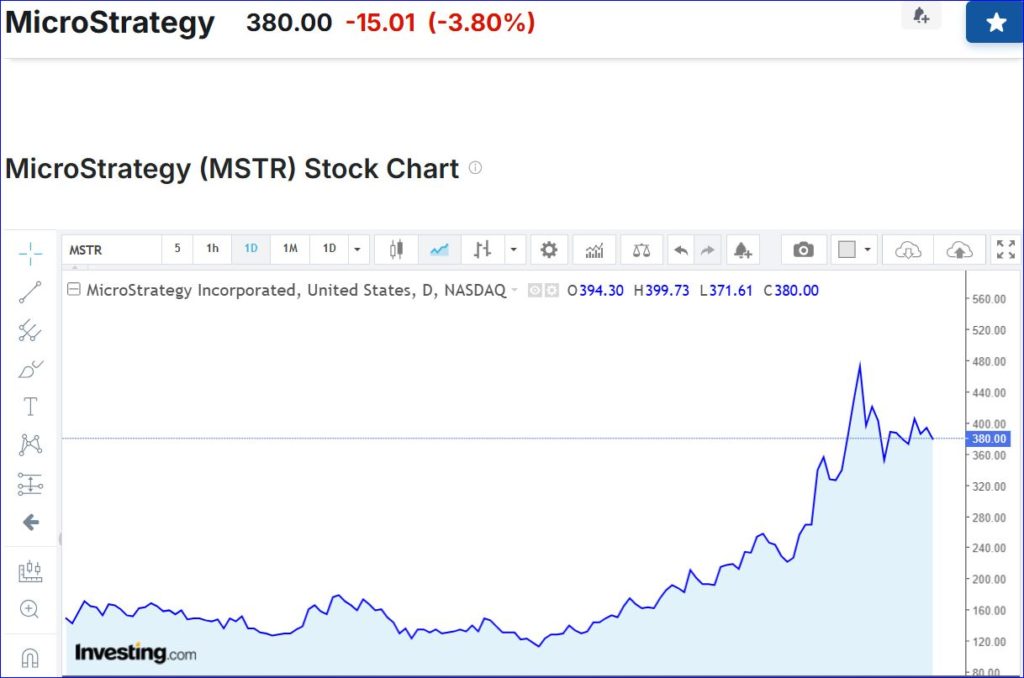December 9, 2024
Meme stocks, those social media darlings, have captured the market’s attention with their sharp price rises and drops. But what happens to these high-flying favorites when the market takes a downturn?
The Case of MicroStrategy (MSTR)
Let’s take a closer look at MicroStrategy (MSTR), a company whose fortunes are heavily tied to the price of Bitcoin. MSTR’s recent surge has been fueled by its aggressive Bitcoin buying spree, financed through massive stock issuance.
What I find nuts is that since Oct. 31, MicroStrategy (MSTR) has issued $10.5 billion of equity to the public, mostly under a new $42 billion program that calls for selling $21 billion of stock and $21 billion of bonds over 3 years to fund more Bitcoin purchases.
This strategy hinges on the assumption that Bitcoin will become a mainstream currency under the Trump 2.0 administration. However, the historical success rate of ventures overseen by the former president is debatable.
Moreover, MSTR’s stock price has already seen significant volatility, soaring from below $150 three months ago to a peak of $543 last month and dropping to its current level under $400. This volatility is due to rapid changes in investor sentiment rather than solid fundamentals driving the price.
MSTR is not in the S&P 500, but if it were, its short float of just under 14% would be the fifth highest of the S&P 500. However, the short ratio is just over 1.0%, which is lower than any of the S&P 500 stocks, so there is no serious likelihood of a short squeeze as long as the trader sentiment is high — At StockCharts.com, the SCTR score is a near maximum 99.5% — and the share price is fairly stable. But once that sentiment SCTR drops, the short sellers will feast.
A Recipe for Trouble: The Ponzi Scheme Analogy
The rapid issuance of new shares to fund Bitcoin purchases raises concerns about the long-term sustainability of this approach. I see this as akin to a Ponzi scheme, where early buyers are rewarded with returns generated by new entrants. This cycle can only continue if there’s a steady influx of new buyers.
In a market downturn, however, this house of cards will likely come crashing down, potentially triggering more legal battles for chairman Michael Saylor beyond his recent fight with the SEC over business practice failures.
Beyond MSTR: The Bigger Meme Stock Picture
Meme stocks, lacking strong underlying fundamentals, are typically the first to be dumped by investors seeking safer havens. This could lead to a rapid decline in MSTR’s price if, as, and when short sellers pile on. However, the vulnerability of meme stocks to market downturns extends beyond MSTR. These companies rely heavily on social media hype to maintain investor interest. When sentiment sours, many short sellers are waiting in the wings to pounce, further accelerating the decline.
Is a Market Crash Imminent?
While predicting market tops is a fool’s game, a few days ago, I pointed out several indicators suggest a bear market is on the horizon. Soaring price-to-earnings ratios for many stocks point towards a potential “reversion to the mean” scenario, where prices drop below the long-term average before finding a sustainable level.
Despite some irresponsible talk by some Wall Street leaders who ought to know better who are saying that history will not repeat itself in this cycle, trust me that history will repeat itself. There will be a reversion to the mean average. Ignoring historical trends and hoping for a different outcome is a recipe for disaster.
The Bottom Line: Preparing for the Inevitable
When it comes, a market correction will hurt unprepared investors, especially those holding meme stocks. 2025 and 2026 will likely see significant volatility, particularly in the chaos many anticipate with Trump 2.0.
The key takeaway? Diversification and focusing on companies with strong fundamentals are crucial for avoiding the pain of a market crash.
Disclaimer: Please do your own research before making any investment decisions. Everything I write here is an opinion directed to the public, which does not constitute specific investment advice to a client.



